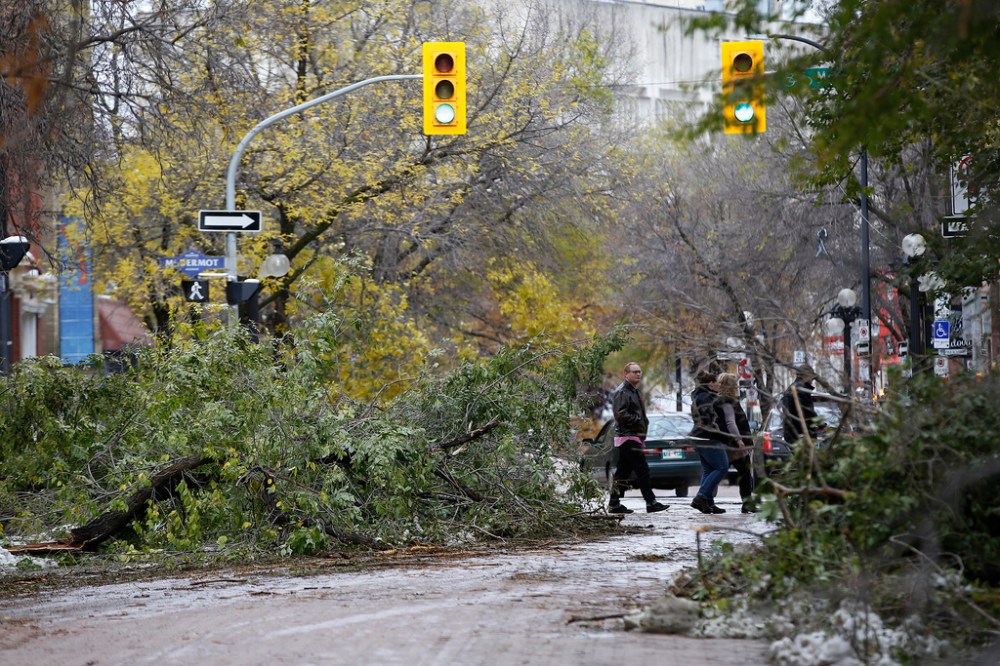Thankful for a warm, well-lit Thanksgiving Manitobans were digging out and huddling up after early winter wallop a year ago
Read this article for free:
or
Already have an account? Log in here »
To continue reading, please subscribe:
Monthly Digital Subscription
$0 for the first 4 weeks*
- Enjoy unlimited reading on winnipegfreepress.com
- Read the E-Edition, our digital replica newspaper
- Access News Break, our award-winning app
- Play interactive puzzles
*No charge for 4 weeks then price increases to the regular rate of $19.95 plus GST every four weeks. Offer available to new and qualified returning subscribers only. Cancel any time.
Monthly Digital Subscription
$4.99/week*
- Enjoy unlimited reading on winnipegfreepress.com
- Read the E-Edition, our digital replica newspaper
- Access News Break, our award-winning app
- Play interactive puzzles
*Billed as $19.95 plus GST every four weeks. Cancel any time.
To continue reading, please subscribe:
Add Free Press access to your Brandon Sun subscription for only an additional
$1 for the first 4 weeks*
*Your next subscription payment will increase by $1.00 and you will be charged $16.99 plus GST for four weeks. After four weeks, your payment will increase to $23.99 plus GST every four weeks.
Read unlimited articles for free today:
or
Already have an account? Log in here »
Hey there, time traveller!
This article was published 09/10/2020 (1919 days ago), so information in it may no longer be current.
A year ago, Manitobans were preparing for Thanksgiving weekend, many without power.
More than 160,000 Manitoba Hydro customers had no electricity during the October snowstorm that saw more than 70 centimetres of snow fall in some parts of Manitoba.
Winnipeggers dug out from about 35 centimetres.
The heavy, wet snow began to fall on Oct. 10 and Manitoba Hydro said the snow and strong winds took down approximately 1,000 kilometres distribution lines, snapping 4,000 wood poles from which they hung.
“When you have 4,000 wood poles damaged or snapped, we don’t have 4,000 wood poles sitting in a yard somewhere. No utility does,” said Bruce Owen, Hydro’s media relations officer.
“What we have to do now, going forward, is in the event that this happens again, we are working with our suppliers and we’re also working internally, so we know what the bare minimum of materials that we need in our yards, in our stockpiles and what’s the bare minimum that our suppliers need in their own stockpiles so we can access it quickly.”
Owen added that more than 300 transmission towers were also damaged. The utility estimates the total costs for repair and cleanup at $100 million.
“It was on a scale that it wasn’t just over several blocks, it was an entire city, and it was the Interlake region and Portage la Prairie,” said Owen.
He said the community came together and was supportive over the weeks it took to return to normal.
“When there are these tough events, these tough natural, almost disaster, events, Manitobans pull together and we saw that,” he said.
“The outpouring of support from customers, many who were without power, was absolutely remarkable. The biggest lesson that we learned is that we cannot take the support of Manitobans for granted.”
About 30,000 trees were damaged or destroyed in Winnipeg; the city said 600 were removed from its property alone. The city’s storm costs have been pegged at about $10 million.
“There was probably the most damage in my career that I have ever seen, and we’ve had some pretty good storm events over the past 20 to 25 years,” said city forester Martha Barwinsky.
“The damage ranged from a small tree with a broken limb, to a large tree which completely failed. Usually in the storms, it’s usually our big, old trees that are impacted, but this really affected every size and species of trees, which really is unprecedented.”
The city is well behind in replacing lost trees.
“We just carried on with our plans for planting this year within our budget,” said Barwinsky. “We’re still trying to catch up with replacing trees that we’ve actually had to remove due to Dutch elm disease… and a wide variety of other problems — not just the storm. Because of the storm and all of the additional removal, we are suffering a backlog of replacement planting anywhere from two to five years now.”
If the forestry branch hadn’t received support from other civic departments, Manitoba Hydro and other municipalities, the cleanup would be continuing.
“Within about two to four weeks we had all of the life-safety, the high-risk concerns addressed, and we pretty much finished all of the cleanup by end of January,” said Barwinsky. “It really was remarkable how quickly everything got cleaned up.”
Some damage is still evident, Barwinsky said.
“There’s still trees that I see as I’m driving around, small and medium-sized trees we planted anywhere from 10 to 20 years ago, and they’re completely bent over,” she said.
“They’re safe, they’re not really going anywhere, but (from) the weight of the wet snow they’re still bent over and haven’t been able to set themselves upright again.”
Premier Brian Pallister declared a state of emergency on Oct. 13, which Owen said was something Hydro required to make use of the agreement it has with neighbouring utilities, delivering personnel from Ontario, Saskatchewan and Minnesota to help with cleanup and repairs.
“The Thanksgiving storm of last year was the first time we saw outside utilities come and help us do restoration,” said Owen. “They brought people and machinery — the tracked vehicles, for instance, that we knew we would need to get access to the hardest-hit areas because a two-wheel-drive truck wouldn’t do it.”
Portage la Prairie residents and businesses were among the worst affected.
Tara-Marie Hall and her family were without power for four days and most the food they had on hand spoiled.
“Trying to feed everybody — because we’re a big family — a decent meal was not always in the cards and doable,” said Hall, who lives with her husband and four children.
Hall, 40, said they had to cut back on water use and couldn’t flush their toilets; the wastewater system in Portage runs on electricity.

They struggled to keep warm, sleeping in parkas.
Life inside was miserable; outside, trees fell on their property, damaging their vehicle and a metal gate.
“We had to get a new vehicle because of the damage,” she said. “We had a huge branch land on the back of it… and then one fell on the front of it. They just said it wasn’t driveable anymore and wasn’t feasible to fix. It just got wrote off.”
Having learned a valuable lesson, Hall said she keeps batteries, a first-aid kit and a lot of extra blankets on hand in case they find themselves in a similar situation.
Owen approved, emphasizing the need to expect the unexpected, including fully charged power banks for cellphones.
“We take for granted that when we flip the switch, the power is there,” he said.
kellen.taniguchi@freepress.mb.ca










